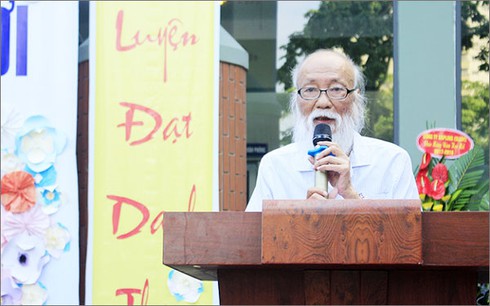Renowned educator Van Nhu Cuong: One minute a day keeps laziness away
(VNF) – Laziness is a bad habit which hold people back from achieving success, said Assoc.Prof.Van Nhu Cuong, a renowned educator in Vietnam, founder and principal of Luong The Vinh highschool.
 |
Assoc. Prof. Van Nhu Cuong speaking to students on anti-laziness technique (source: VOV)
In a 10-minute speech, Assoc.Prof.Van Nhu Cuong played the role of a doctor who presented an analysis on the disease named ‘laziness’ and provided prescription for the infected.
Laziness is a very dangerous disease, because it drags people down and turn one into a useless person, Cuong said.
What makes him concerned the most is if it becomes widespread, the society will be pulled downhill, progress and development are hindered.
Laziness’ harmful impact is not very visible, however, little by little, it will erode the 'patient’s dignity, take away his enthusiasm and aspiration. Without having an idea of contributing to society, the 'patient' 's life becomes meaningless.
Cuong continued his speech by pointing out several symptoms of ‘laziness’ among students, including lazy to learn, lazy to listen to lecture, lazy to do homework, lazy to think critically and lazy to raise questions.
“ I am sure that everyone of us here once was or has been affected by this disease.” He said.
"You only live once, a lazy person’s life will be shortened as time is wasted," Cuong added.
“The 'patient' will live aimlessly, without thinking of or doing anything. Time just slips away through his finger, hour by hour, day by day, or even year by year”, the educator said.
To illustrate his statement, Cuong told the listeners a story about a typical patient of laziness.
“Let’s imagine. A new day has come. It is 6 am in the morning but our ‘main character’ has yet to wake up," he opened the story.
"When his parent ask him to leave his bed, he keeps saying that he needs more rest, as yesterday he stayed up late for study, until 12 am.
The boy actually is lying, since last night his sleeping time was spent on playing game and chatting with online friends, instead of revising the lessons.
The boy continues to sleep until 6:45 am, and suddendly get up when he knows it is too late. He rushes to school without having his breakfast.
Being aware that he is already late for the first lesson, he decided to skip it, and go to the canteen to grab a snack.
The bell rings, it is time for the second lesson which is kick started by a 15-min exam.
The boy obviously had nothing to write in his exam paper, and blamed it on his ‘bad luck’.
Instead of providing his answer for the exam question, he tried to find an excuse to fill in the blank paper “Last night I had to go to the airport to pick up my relative, I therefore arrived home very late and did not have time to study”, he wrote.
He later came back home with an exhausted, miserable look, telling his mum “I am sick today, having a splitting headache.”
In the afternoon, the boy goes to his tutorial class and at the first glance, he finds the base of his lazy gang at the rear of the room. He sits down and they start gossiping.
In the evening, the boy goes back home and again, spends time on online chatting, instead of studying.
That’s a typical day of a lazy boy, and it is repeated on the next day, like a circle without an exit," Cuong said.
He later offered to the audience his recommendation to combat laziness.
“First and foremost, you need to detect whether you’re infected with the ‘laziness disease’, and if the answer is ‘yes’, the next step is to figure out the stages of the disease, how serious it is."
"Everyone wants to find a presciption for his disease. For this type of disease, the best medicine is ‘strong will” He noted.
I am talking about a simple technique which has proved its effectiveness in helping a lot of people, including myself, get rid of laziness. It was invented by a Japanese scholar named Masaaki Imai.
This technique is known as “Kaizen”, which mean “innovation”.
 |
1 minute of learning a new English word or solving a simple Maths quiz everyday can help you step by step get rid of laziness (source: Daily Mail UK)
“Accordingly, you only need to spend one minute every day at a fixed point of time on doing something
It should be the thing that you dislike the most and often postpone.
"Remember, after one minute, you have to stop doing it. The key point is you must do it everyday persistenly.” Cuong elaborated.
“The activity you choose can be a 10-time press-up, English new word learning or a simple Maths problem in you workbook," the teacher noted, stressing that the effort must be carried on everyday.
After a while of following the schedule, you will feel like you are getting used to the activity, and even see some signs of improvement.
Not long after, you’ll become more interested in the work, and one minute will be not enough to satisfy you. It’s time for you to increase the amount of kaizen time to 10 or even 20 mins.
You can also consider adding to your list other activities.
"I was the one who tried it and have seen the positive effects, so I'm sure this simple technique would help you.
Please remember “No more Procrastination .” Cuong noted.
About Assoc. Prof.Van Nhu Cuong:
Assoc.Professor Van Nhu Cuong is a credible educator in Vietnam, who has trained generations of talented students.
In the 1970s, after successfully defended his doctoral dissertation in Mathematics in the former Soviet Union, he worked for the Mathematics Department at Hanoi National University of Education.
In 1989, he founded Luong The Vinh highschool, one of the first private highschools in Hanoi, which has long been well-knowned for its tradition in quality teaching./.
( Translated by Phi Yen )
Recommended
 National
National
Prime Minister Allocates 4.56 Trillion VND to Eradicate Dilapidated Homes
 National
National
Vietnam News Today (Apr. 2): Vietnam – Destination for World Leaders Amid Global Trade Tensions
 National
National
Vietnam News Today (Apr. 1): Vietnam Values Multifaceted Cooperation With Belgium
 National
National
Vietnam News Today (Mar. 31): King Philippe and Queen Mathilde of Belgium Begin State Visit to Vietnam
 National
National
Vietnam News Today (Mar. 30): Golden Opportunity to Take Vietnam-Belgium Relations to New Heights
 National
National
Vietnam News Today (Mar. 29): Vietnam Values Brazil as Key Partner in Latin America
 National
National
Vietnam News Today (Mar. 28): Vietnam and Brazil to Realize 2024 Strategic Partnership Framework
 National
National
